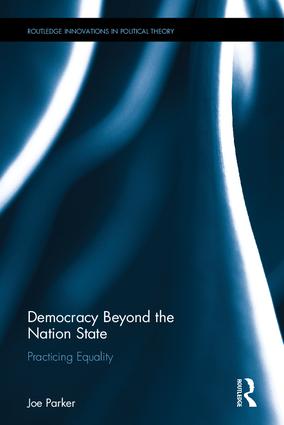 Claremont, Calif. (August 2, 2017)—In his new book, Democracy Beyond the Nation State: Practicing Equality, Pitzer College Professor Joe Parker asks how democracy can “serve all rather than the few” and address fundamental issues of inequality. Published by Routledge, Democracy Beyond the Nation State examines communities that practice “horizontal democracy” where governance is broadly inclusive rather than funneled through political elites or centralized structures.
Claremont, Calif. (August 2, 2017)—In his new book, Democracy Beyond the Nation State: Practicing Equality, Pitzer College Professor Joe Parker asks how democracy can “serve all rather than the few” and address fundamental issues of inequality. Published by Routledge, Democracy Beyond the Nation State examines communities that practice “horizontal democracy” where governance is broadly inclusive rather than funneled through political elites or centralized structures.
“Horizontal democracy is something that electoral practices can’t produce,” says Parker, who is a professor of international and intercultural studies at Pitzer. “Elections are designed to produce an elite: They tell 10,000 people, ‘You stay home,’ and send one person to Sacramento, one person to DC.”
In contrast, the power in groups that govern by assembly and consensus, such as the Iroquois or Zapatistas, is decentralized, “not kept by the king or the dictator, but held by everybody,” Parker says.
Democracy Beyond the Nation State surveys communities like these around the world, from India to Brazil, from Argentina to the US. Parker explores how they practice, rather than preach, equality, and how they find ways to reduce gaps in health and wealth, and to share work, land, housing and social benefits.
Parker didn’t have to look long and hard to find groups practicing horizontal democracy; he said his challenge was narrowing down all the examples to the approximately 25 communities that appear in the book.
“This kind of equality practice is everywhere,” he says.
Renowned gender theorist, professor and author Judith Butler calls Democracy Beyond the Nation State an important book that shows “how ‘practicing equality’ is essential to any substantive account of democracy.”
“Through a series of examples of global and local solidarity, participation and assembly, Joe Parker demonstrates how equality can, and does, achieve concrete meaning in the practices of communities,” Butler writes. “Shifting our attention away from abstraction and toward popular and enacted forms of democracy, this crucial book considers how groups constitute and distribute power in an effort to produce democratic forms of life with equality at their center.”
Parker wrote the book with three audiences in mind: people outside of academia who are interested in democracy; students in college who are studying politics; and people looking for alternative ways to practice politics. Political theory is woven throughout the book, but Parker saves the reflections of theorists Jacques Derrida, Michel Foucault, Gayatri Spivak and others for the reference sections.
“Academics love footnotes, so I put all kinds of juicy stuff in there,” he said.
At a time when people across the political spectrum talk about broken political systems and growing wealth gaps, Democracy Beyond the Nation State offers example after example of alternative governance.
“If people want to practice equality, it’s completely possible,” Parker says. “People do it all over the world, all the time. That is the really hopeful part of the book.”
About the Author

Joe Parker has taught international and intercultural studies at Pitzer College since 1989. He teaches in a wide variety of fields, including Asian studies, cultural studies and feminism. His courses include Whose Justice?, Feminist Methods and Decolonization from Below. Parker is also an adjunct professor at Claremont Graduate University. He writes a regular blog called “Democracies 2 Come.” He earned his PhD and master’s degree at Harvard University and his undergraduate degree at Occidental College.